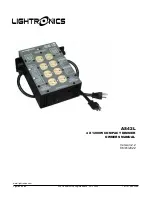
19 ENGLISH
Switch action
WARNING:
For your safety, this tool is
equipped with lock-off lever which prevents the
tool from unintended starting. NEVER use the tool
if it runs when you simply pull the switch trigger
without pressing the lock-off lever. Return the
tool to our authorized service center for proper
repairs BEFORE further usage.
WARNING:
NEVER tape down or defeat pur-
pose and function of lock-off lever.
CAUTION:
Before installing the battery car-
tridge into the tool, always check to see that the
switch trigger actuates properly and returns to
the "OFF" position when released.
Operating a tool
with a switch that does not actuate properly can lead
to loss of control and serious personal injury.
CAUTION:
Never put your finger on the main
power button and switch trigger when carrying
the tool.
The tool may start unintentionally and cause
injury.
NOTICE:
Do not pull the switch trigger hard with-
out pressing the lock-off lever. This can cause
switch breakage.
To prevent the switch trigger from being accidentally
pulled, a lock-off lever is provided. To start the tool,
depress the lock-off lever and pull the switch trigger.
The tool speed increases by increasing pressure on the
switch trigger. Release the switch trigger to stop.
►
Fig.8:
1.
Lock-off lever
2.
Switch trigger
Speed adjusting
You can adjust the tool speed by tapping the main
power button. Each time you tap the main power button,
the level of speed will change. The tool automatically
adjusts the rotation speed according to the cutting tool
attached to the tool.
►
Fig.9:
1.
Speed indicator
2.
Main power button
Speed
indicator
Mode
Rotation speed
Cutter blade/
Plastic blade
Nylon cutting
head
High
0 - 6,800 min
-1
0 - 5,000 min
-1
Medium
0 - 5,000 min
-1
0 - 4,200 min
-1
Low
0 - 3,500 min
-1
0 - 3,500 min
-1
Automatic Torque Drive Technology
When you turn on the Automatic Torque Drive
Technology (ADT), the tool runs at optimum rotation
speed and torque for the condition of grass being cut.
The tool automatically detects the cutting tool attached
and choose a suitable rotation speed.
To start ADT, press and hold the reverse button until the
ADT indicator turns on.
To stop ADT, press and hold the reverse button until the
ADT indicator turns off.
►
Fig.10:
1.
ADT indicator
2.
Reverse button
Indicator
Mode
Cutting tool
Rotation
speed
ADT
Cutter blade
Plastic blade
3,500 - 6,800
min
-1
Nylon cutting
head
3,500 - 5,000
min
-1
Reverse button for debris removal
WARNING:
Switch off the tool and remove
the battery cartridge before you remove entan-
gled weeds or debris which the reverse rotation
function can not remove.
Failure to switch off and
remove the battery cartridge may result in serious
personal injury from accidental start-up.
This tool has a reverse button to change the direction of
rotation. It is only for removing weeds and debris entan-
gled in the tool.
To reverse the rotation, tap the reverse button and pull
the switch trigger while depressing the lock-off lever
when the cutting tool is stopped. The speed indicators
and ADT indicator start blinking, and the cutting tool
rotates in reverse direction when you pull the switch
trigger.
To return to regular rotation, release the trigger and wait
until the cutting tool stops.
►
Fig.11:
1.
Speed indicator
2.
ADT indicator
3.
Reverse button
NOTE:
During the reverse rotation, the tool operates
only for a short period of time and then automatically
stops.
NOTE:
Once the tool is stopped, the rotation returns
to regular direction when you start the tool again.
NOTE:
If you tap the reverse button while the cutting
tool is still rotating, the tool comes to stop and to be
ready for reverse rotation.
Electric brake
This tool is equipped with an electric brake. If the tool
consistently fails to quickly stop after the switch trigger
is released, have the tool serviced at a Makita service
center.
Summary of Contents for UR012G
Page 2: ...Fig 1 12 2 Fig 2 12 1 2 3 4 5 8 9 10 11 Fig 3 6 7 8 9 10 11 12 13 14 15 16 1 2 3 4 5 Fig 4 2 ...
Page 3: ...1 1 2 3 Fig 5 1 2 Fig 6 2 1 Fig 7 1 2 Fig 8 2 1 Fig 9 2 1 Fig 10 3 2 1 Fig 11 3 ...
Page 7: ...1 Fig 36 Fig 37 Fig 38 Fig 39 7 ...
Page 8: ...1 2 3 5 4 6 7 8 3 m 80 mm 100 mm Fig 40 8 ...
Page 9: ...9 1 2 4 3 5 6 3 m 100 mm Fig 41 ...
Page 10: ...10 Fig 42 1 2 Fig 43 90 90 1 2 Fig 44 ...
Page 162: ...162 ...
Page 163: ...163 ...
















































